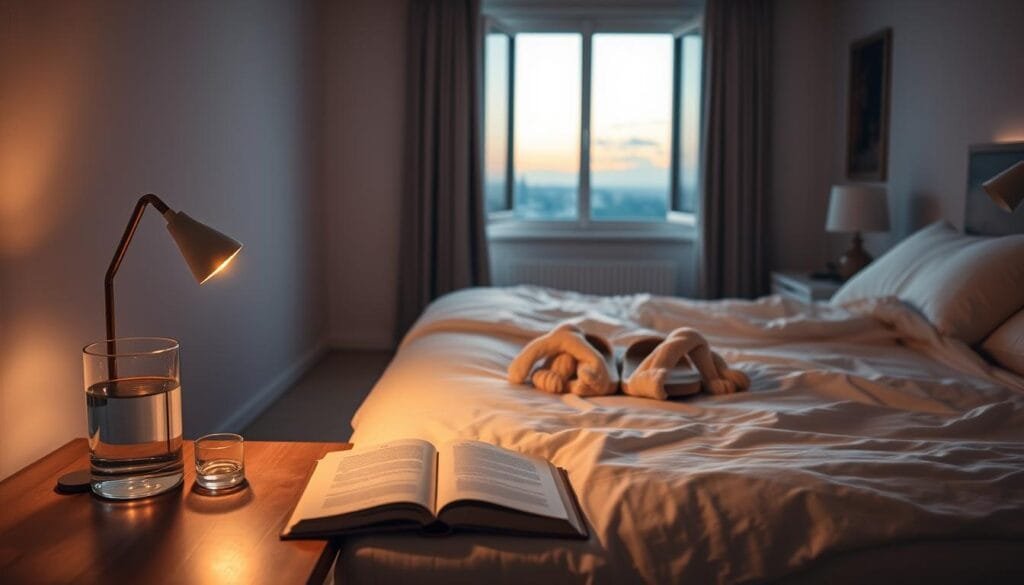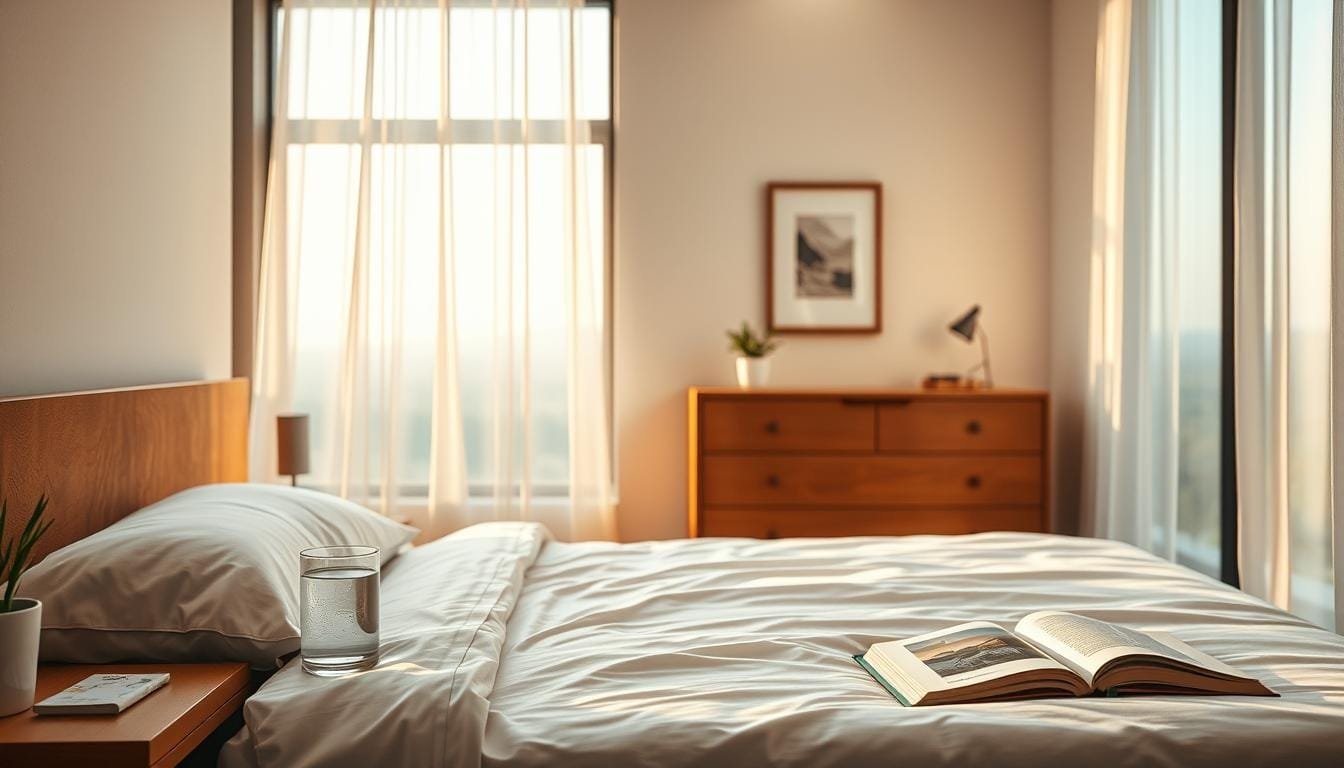Tossing and turning every night can feel like a silent battle. You’re exhausted, yet sleep remains frustratingly elusive. The good news? A simple bedtime routine to fall asleep faster isn’t just a dream—it’s an achievable reality that can transform your nights and energize your days.
Quality sleep isn’t about luck. It’s about creating healthy sleep habits that signal your body it’s time to rest. Imagine drifting off effortlessly, without the anxiety of watching the clock tick away precious hours of sleep.
This guide will walk you through practical, science-backed strategies to develop a bedtime routine that works. From understanding your body’s natural rhythms to creating a peaceful sleep environment, you’ll discover actionable steps to reclaim your nights and wake up refreshed.
Table of Contents
Understanding the Science Behind a Restful Night’s Sleep
Sleep is a complex process that’s key to your health and happiness. Learning about sleep science can help you find natural ways to sleep better.
Your body has an internal clock called the circadian rhythm. It controls when you sleep and wake up. It responds to light and darkness to keep your sleep schedule regular.
Decoding Your Body’s Sleep Signals
Sleep has many stages that help your body heal and refresh. Knowing these stages can lead to natural sleep remedies that improve your rest.
- Stage 1: Light sleep – where your body begins to relax
- Stage 2: Deeper sleep – body temperature drops
- Stage 3: Slow-wave sleep – critical for physical recovery
- REM sleep: Essential for mental processing and emotional regulation
The Biology of Falling Asleep
Your brain releases hormones that make you sleepy. Melatonin, the sleep hormone, tells your body it’s time to rest. Cortisol levels go down, helping you fall asleep peacefully.
Understanding your body’s natural sleep mechanisms can transform your approach to rest and recovery.
By living in sync with your body’s rhythms, you can improve your sleep. This way, your sleep techniques will work well with your body’s natural processes.
Why Your Current Sleep Routine Might Not Be Working

Having trouble sleeping? Your current sleep routine might be the problem. Many people unknowingly block their path to quality sleep.
Let’s look at some common sleep tips that might be messing with your sleep:
- Inconsistent bedtime schedules
- Too much screen time before bed
- High-stress evening activities
- Drinking caffeine too late
- A messy sleep environment
Reducing sleep anxiety starts with knowing your habits. Your body likes routine and predictability. Unpredictable sleep patterns confuse your body’s clock, making it hard to sleep well.
“Sleep is not a luxury, it’s a necessity for your mental and physical well-being.” – Sleep Experts
Digital devices can mess with your sleep. The blue light from phones and computers can lower melatonin levels. This keeps your brain awake when it should be resting.
Stress and anxiety also mess with sleep. Activities that make you think too much before bed can wake you up. This makes it hard to relax.
- Avoid intense work conversations before bed
- Make your sleep area calm
- Try mindfulness
- Don’t have too much caffeine or heavy meals at night
Knowing these challenges is the first step to a better sleep routine. It helps your body follow its natural sleep patterns.
Creating Your Simple Bedtime Routine to Fall Asleep Faster
Creating a consistent bedtime routine can make falling asleep easier and nights more restful. It’s not about complicated steps. It’s about setting a pattern that tells your body it’s time to relax.

A good pre-sleep routine trains your brain to know when it’s time to rest. By adding a few simple practices, you can change your night routine and lower stress about falling asleep.
Essential Components of an Effective Routine
Your bedtime routine should include activities that relax you and help you forget the day’s stress. Here are some key parts:
- Dim the lights in your living space
- Disconnect from electronic devices
- Practice gentle stretching or meditation
- Read a calming book
- Drink herbal tea
Timing Your Routine for Maximum Effect
Begin your pre-sleep routine 60-90 minutes before bedtime. This time lets your body slowly relax, making it easier to fall asleep.
Adapting the Routine to Your Lifestyle
Your bedtime routine should be personal and feel right. Try different activities to find what works for you. Some like reading, while others prefer yoga or deep breathing.
The key is consistency and finding a routine that genuinely helps you unwind.
Your own pre-sleep routine can be a powerful tool for better sleep, less nighttime anxiety, and better health.
Setting Up Your Bedroom for Optimal Sleep

Creating the perfect sleep environment is key for quality rest. It’s not just about having a comfy bed. With a few changes, your bedroom can become a place of calm, helping you sleep naturally.
First, check your bedroom’s basics. Temperature is very important for sleep. Keep your room between 60-67 degrees Fahrenheit for the best sleep. A room that’s too hot or cold can mess up your sleep.
- Invest in breathable, lightweight bedding
- Use blackout curtains to block external light
- Consider a white noise machine to mask disruptive sounds
- Choose calming, neutral colors for your bedroom decor
Lighting is also vital. Blue light from screens can mess with your sleep hormones. Use soft, warm lights in the evening to create a calm atmosphere.
Natural sleep aids can make your bedroom peaceful. Try aromatherapy with lavender or chamomile oils. Keep your room tidy to help relax your mind and reduce stress.
Your bedroom should be a dedicated space for rest and rejuvenation.
By using these simple tips, you can make your bedroom perfect for sleep. It will help your body’s natural rhythm and give you deeper, better sleep.
The Power of Consistent Sleep and Wake Times
Your body loves rhythm. A steady sleep schedule helps you sleep better and feel more awake during the day. When you stick to healthy sleep habits, your body gets in sync. This makes falling asleep easier and waking up more refreshed.
Creating a reliable sleep pattern is more than just picking a bedtime. It’s about teaching your body when to relax and when to wake up. This natural rhythm can boost your health, mood, and brain power.
Weekend Sleep Strategies
Weekends can mess up our sleep routine. Many people sleep in or stay up late, upsetting their schedule. To keep healthy sleep habits, try these tips:
- Limit weekend sleep variation to 1 hour maximum
- Go to bed and wake up at similar times
- Avoid long afternoon naps
- Expose yourself to morning sunlight
Naturally Adjusting Your Internal Clock
Your body’s internal clock listens to outside signals. Light exposure is key in setting your sleep-wake cycle. Spend daylight hours outside and cut down on blue light at night to reset your rhythm.
Creating a consistent sleep schedule takes time. Be kind to yourself and make small, lasting changes that fit your life.
Evening Habits That Promote Better Sleep
Creating effective wind-down activities is key to getting ready for sleep. Your evening routine greatly affects how well you sleep. It’s important to make habits that tell your body it’s time to relax.
Here are some sleep hygiene tips to make your evening calm:
- Create a consistent digital sunset by putting away electronic devices 1-2 hours before bedtime
- Practice gentle stretching or light yoga to release physical tension
- Engage in calming activities like reading or listening to soft music
- Take a warm bath or shower to lower your body temperature naturally
Mindful activities can reduce stress and get your nervous system ready for sleep. Try meditation or deep breathing to calm your mind. These practices help you move from being alert to relaxed, making it easier to fall asleep.
The key is consistency and finding activities that genuinely help you feel relaxed and peaceful.
Your evening routine should be personal and tailored to what works best for you. Try different wind-down activities and see how your body reacts. The goal is to create a pattern that tells your brain it’s time to rest.
Natural Relaxation Techniques for Deep Sleep
Getting quality sleep is hard in today’s fast world. Luckily, natural ways to relax can help. By adding these simple steps to your bedtime, you can improve your sleep.
Breathing Exercises for Peaceful Slumber
Breathing exercises are great for calming your mind and body. The 4-7-8 method is very effective:
- Inhale quietly through your nose for 4 seconds
- Hold your breath for 7 seconds
- Exhale completely through your mouth for 8 seconds
- Repeat this cycle 4 times
This method reduces stress and brings peace before bed. Doing it often will help a lot.
Progressive Muscle Relaxation Guide
Progressive muscle relaxation is also a great natural remedy. It involves tensing and then relaxing muscle groups to release tension:
- Start by lying comfortably in bed
- Begin with your toes, tense them for 5 seconds
- Release and feel the muscles relax completely
- Move progressively up through your body
- End with your facial muscles
Regularly practicing these techniques trains your body to release stress. This prepares you for deep, restful sleep.
Technology and Sleep: Finding the Right Balance
Digital devices are a big part of our lives, but they can mess with our sleep. Tips for better sleep say tech might be keeping you awake more than you think. Smartphones, tablets, and computers give off blue light, which can stop your body from making melatonin. This makes it tough to fall asleep.
Understanding how tech affects your sleep is key to reducing anxiety. Watching screens before bed can keep your brain active, making it hard to relax. Setting limits on tech use can really help you sleep better.
- Set a strict digital curfew 1-2 hours before bedtime
- Use blue light filtering apps or device settings
- Keep electronic devices out of the bedroom
- Enable night mode on all screens
“Technology should enhance our lives, not disrupt our most essential biological function – sleep.” – Sleep Research Institute
Think of sleep-tracking apps as useful tools, but don’t rely on them too much. These apps can show you how you sleep, but they shouldn’t add stress. Use them to guide you, not as strict rules that might make you anxious about sleep.
Creating smart tech habits can make your bedtime routine more calming. Your bedroom should be a place for rest, away from digital distractions.
Nutrition Tips for Better Sleep Quality
Your diet is key to better sleep. What and when you eat affects your sleep. Knowing how nutrition helps sleep can guide you to a restful night.
Some foods are natural sleep aids. They help your body get ready for sleep. Choosing the right foods for dinner can greatly improve your sleep.
Foods That Promote Better Sleep
- Almonds: Rich in magnesium, which helps relax muscles and calm nerves
- Cherries: Natural source of melatonin, the sleep hormone
- Warm milk: Contains tryptophan, which promotes relaxation
- Bananas: Packed with potassium and magnesium, helping muscle relaxation
- Herbal tea: Chamomile can reduce anxiety and prepare your body for sleep
Timing Your Evening Meal
When you eat your last meal matters for sleep. Experts say eat your last meal 2-3 hours before bed. This lets your body digest food without discomfort.
Pro tip: Choose light, easily digestible foods in the evening to support your natural sleep cycle.
Avoid big, spicy meals before bed. They can cause indigestion and keep you awake. Go for small, nutritious snacks to help your body relax.
Physical Activity’s Role in Sleep Quality
Exercise is key to good sleep habits. Your day’s activity affects your sleep quality. This shows a strong link between moving and resting well.
Various exercises can improve sleep. Regular activity helps your body’s natural sleep cycle. This makes it easier to fall and stay asleep.
- Morning workouts can boost your energy and regulate circadian rhythms
- Evening exercises can help reduce stress and prepare your body for rest
- Light activities like walking can improve overall sleep quality
“Movement is medicine for creating change in a person’s physical, emotional, and mental states.” – Dr. Andrew Weil
Finding the right exercise intensity and timing is important. Moderate activities like brisk walking or cycling can greatly improve sleep. Try to do at least 30 minutes of activity most days.
Start slow if you’re new to exercise. Listen to your body and pick activities you like. Being consistent is more important than how hard you exercise for good sleep.
When you exercise is also important. Avoid intense workouts close to bedtime. Instead, do gentle stretches or yoga in the evening.
Managing Stress and Anxiety for Better Sleep
Sleep can be hard when stress and anxiety fill your mind. Many find it hard to relax and fall asleep because of racing thoughts. To reduce sleep anxiety, you need a plan that calms your mind and body.
Mindfulness for better sleep is more than a trend. It’s a strong tool to help you relax and create a calm space before bed.
Mindfulness Practices for Bedtime
Mindfulness techniques can change how you sleep. Try these effective methods:
- Practice 5-minute guided meditation
- Use deep breathing exercises
- Perform gentle body scan relaxation
- Create a quiet, distraction-free environment
Journaling to Clear Your Mind
Writing can help reduce sleep anxiety. Spend 10-15 minutes before bed writing down your thoughts, worries, and reflections. This helps:
- Release mental tension
- Process daily experiences
- Identify stress triggers
- Make room for relaxation
Remember, being consistent is important in creating a mindful bedtime routine for better sleep.
Creating a Calming Pre-Sleep Environment
Turning your home into a sleep haven is key for better sleep. Your bedtime routine begins with making a space that tells your body it’s time to relax and rest.
Start by making a sensory experience that helps you relax. Dim the lights to help your body make melatonin. Soft, warm lighting helps your mind move from the day’s hustle to a calm state.
- Use warm-toned light bulbs (2700-3000K color temperature)
- Install dimmer switches in bedroom and living areas
- Avoid bright overhead lighting in evening hours
Temperature is also important for good sleep. Keep your bedroom between 60-67 degrees Fahrenheit. This cool temperature helps your body naturally cool down while you sleep.
“The perfect sleep environment is like a cocoon of calm, designed to help you drift effortlessly into deep, restorative rest.” – Sleep Wellness Institute
Managing noise is part of your bedtime routine. White noise machines, soft sounds, or earplugs can make a quiet space. This reduces outside noises that might wake you up.
- Use white noise generators
- Try noise-canceling headphones
- Seal windows to reduce external sounds
Adding natural elements can improve your sleep space. Lavender essential oils, calming teas, and soft blankets can make a soothing experience. They signal to your body that it’s time to relax.
Common Sleep Routine Mistakes to Avoid
Getting good sleep can be tough. Many find it hard to stick to sleep habits that fit their life. Knowing common mistakes helps you make a better sleep plan.
Breaking Bad Sleep Habits
Spotting and fixing bad sleep habits is key to better sleep. Common mistakes include:
- Irregular bedtime schedules
- Using electronic devices before sleep
- Consuming caffeine late in the day
- Ignoring your body’s natural sleep signals
Overcoming Sleep Routine Challenges
Building lasting sleep habits takes time and planning. Begin by figuring out what stops you from sleeping well. Here are some tips:
- Track your current sleep patterns
- Gradually adjust your routine
- Create a consistent wind-down process
- Be flexible but committed
Remember, perfect sleep routines don’t exist. What matters is finding a approach that works for your unique lifestyle and needs.
Consistency is key when developing healthy sleep habits. Small, incremental changes often lead to the most sustainable improvements.
Tracking Your Sleep Progress
Keeping an eye on your sleep quality journey is key. It’s important to track your progress closely. Your sleep schedule becomes more valuable when you document and analyze it.
Begin by making a simple sleep diary. In it, write down important details about your sleep each night. This helps you spot patterns and find ways to improve.
- Track bedtime and wake-up times
- Note total sleep duration
- Rate your morning energy levels
- Document any nighttime interruptions
Digital sleep tracking apps can give you deeper insights into your sleep. They offer detailed analytics that manual tracking can’t match. These tools help you see your sleep quality improvement with graphs and reports.
“Knowledge is power, when it comes to understanding your sleep patterns.” – Sleep Wellness Expert
Review your sleep data every two weeks. Look for trends in your sleep schedule and make small changes. Notice how changes in your evening routine affect your sleep quality.
Remember, tracking sleep is a personal journey. What works for one might not work for another. Be patient and see this as a journey of self-discovery and wellness.
Conclusion
Improving your sleep quality doesn’t need big changes. A simple bedtime routine can make a big difference. By making small, smart changes, you can improve your sleep easily.
We’ve talked about ways to get better sleep. From knowing your body’s rhythms to making your bedroom calm, each step helps. Remember, your perfect routine is unique. It might need small tweaks to fit you.
Try one or two new things tonight. It could be going to bed at the same time, doing relaxation breathing, or avoiding screens before bed. Small steps can make a big difference. Your journey to better sleep is a personal one that can boost your health and productivity.
Don’t be afraid to try new things and track your progress. Your ideal sleep routine is just a few nights away. Share your journey with our community. Let’s support each other in finding restful sleep.






